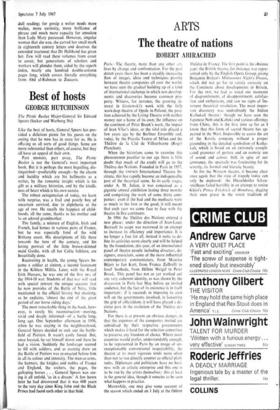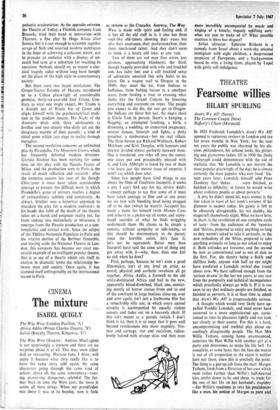The theatre of nations ARTS
ROBERT ABIRACHED
Paris—The theatre, more than any other art, lives by change and confrontation. For the past dozen years there has been a steadily increasing flow of images, ideas and techniques passing between theatre companies all over the world; we have seen the gradual building up of a kind of international exchange in which new develop- ments and discoveries become common pro- perty. Witness, for instance, the growing in- terest in Gratowski's work with the little workshop theatre of Opole in Poland; the posi- tion achieved by the Living Theatre with neither money nor a home of its own; the influence on the continent of Peter Brook's work, the impact of Jean Vilar's ideas, or the vital role played a few years ago by the Berliner Ensemble and, today, by the Piccolo Teatro of Milan and the Theatre de la Cite de Villeurbanne (Roger Planchon).
When the historians come to examine this phenomenon peculiar to our age there is little doubt that much of the credit will go to the Theatre des Nations. Founded in Paris in 1957, through the tonstEsco International Theatre In- stitute, this has rapidly become an indispensable part of the theatrical scene. In its early stages, under A. M. Julien, it was conceived as a gigantic annual exhibition lasting three months and comprising the work of some thirty com- panies: even if the bad and the mediocre were as much to the fore as the good, it still meant that each year we came face to face with the theatre in five continents.
In 1966 the Theatre des Nations entered a new phase: under the direction of Jean-Louis Barrault its scope was narrowed in an attempt to increase its efficiency and importance. It is no longer a free for all, instead it seeks to de- fine its activities more clearly and will be helped by the foundation, this year, of an international panel of theatre people including directors, de- signers, musicians, some of the more influential contemporary commentators, from Maurice Mart to Jan Kott, from Franco Zeffirelli to Josef Svoboda, from Helene Weigel to Peter Brook. This panel has not as yet worked out any very coherent identity, as was shown by the discussion in Paris last May before an invited audience, but the fact of its existence is in itself important : if it succeeds in imposing its ow n will on the governments involved, in loosenin.4. the grip of officialdom, it will have played a de- cisive part in the evolution of the Theatre des Nations.
For there is at present an obvious danger, in that the expenses of the companies invited are subsidised by their respective governments which makes it hard for the selection committee to preserve any freedom of choice. Where most countries would prefer, understandably enough, to be represented in Paris by an image of un- exceptionable conventional respectability, the theatre at its most vigorous tends more often than not to run directly counter to official plati- tudes. Diplomats and politicians have no busi- ness with an artistic enterprise and this one is to be run by the artists themselves: this at least is the general idea, though it remains to be seen what happens in practice.
Meanwhile, one may give some account of the season which ended on 1 July at the Odeon
Theatre de France. The first point is the obvious gaps: the British theatre, for instance, was repre- sented only by the English Opera Group, giving Benjamin Britten's Midsummer Night's Dream, which did not go far to satisfy curiosity on the Continent about developments in Britain. For the rest, we had as usual our moments of disgruntlement, of disappointment, satisfac- tion and enthusiasm, and saw no signs of im- minent theatrical revolution. The most impor- tant discovery was undoubtedly the Indian Kathakali theatre : though we have seen the Japanese Nob and Kabuki and various offerings from China, this is the first time so far as I know that this form of sacred theatre has ap- peared in the West. Impossible to assess the art of the Kerala company without a proper grounding in the detailed symbolism of Katha- kali, which is based on an extremely compli- cated grammar of gesture and an esoteric use of sound and colour. Still, in spite of our ignorance, the spectacle was fascinating for its severity, its formal and hieratic beauty.
As for the Western theatre, it became clear once again that the state of tragedy today can only be deplored : the Dusseldorfer Schau- spielhaus failed horribly in an attempt to revive Kleist's Prince Friedrich of Homburg, digging their own grave in the worst tradition of
pedantic academicism. At the opposite extreme. the Theatre of Today, a Flemish company from Brussels, tried their hand at innovation-Avith Thyestes, a fine play by Hugo Klaus after Seneca, but it is not enough to scramble together scraps of Noh and assorted modern techniques in the hope of achieving a coherent whole; nor to provoke an audience with a display of un- couth bad taste as a substitute for reaching, its emotions. Nobody should try to mount a clas- sical tragedy today without long hard thought on the place of the high style in contemporary society.
But there were two major revelations. The Grupo-Tea tro Estudio of Havana introduced us to a Cuban playwright of considerable promise, thirty-six-year-old Josa Triana. Con- trary to what one might expect, Mr Triana is a disciple not of Brecht but -of Genet and aligns himself with the psychoanalytical tradi- tion in the modern theatre. His Night of the Assassins • deals with three adolescents (a brother and two sisters) who daily act out the imaginary murder of their parents: a kind of ritual game which lays siege to reality through metaphor.
The second revelation concerns an unfinished play by Pirandello, The Mountain Giants,,which has frequently defeated modern directors. Giorgio Strehler has been working for some time on this play with the Piccolo Teatro of Milan, and the production seen in Paris is the result of much reflection and research: after the immense success last year of the Baru& Chiozzotto it must have taken considerable courage to present this difficult work in which Pirandello's game of mirrors reaches a degree of extraordinary subtlety and complexity. As always, Strehler uses a historical approach to elucidate the play for a modern audience:- in his hands this fable of the death of the theatre takes on a harsh and poignant reality but, far from sinking into melancholy or bitterness, it emerges from the Piccolo production as a COD- templative and critical work. Since the eclipse of the Theatre Nationale Populaire in Paris and the relative decline of the Berliner Ensemble, and leaving aside the National Theatre in Lon- don, this company has become our most suc- cessful example of an intelligent popular theatre, that is to say of a theatre which sets itself to analyse in dramatic terms the relationship be- tween man and society. Once again, it has stamped itself unforgettably on the international season in Paris.







































 Previous page
Previous page